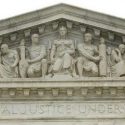Trump travel ban: Appeals court takes first look at revised order
President Trump’s revision of his controversial executive order imposing a travel and refugee ban on certain countries will get an important legal test on Monday, when a federal appeals court in Virginia weighs whether the administration overstepped its authority.
At issue is whether the ban violates the Religion Clause of the First Amendment, the Due Process Clause of the Fifth and 14th Amendments, and the ban on nationality discrimination in the issuance of immigrant visas contained in a 65-year-old congressional law.
The case will be a major test of presidential power, especially in the area of immigration.
The White House frames the issue as a temporary move involving national security. A coalition of groups in opposition call the order blatant religious discrimination, since the six countries involved have mostly Muslim populations: Iran, Libya, Somalia, Sudan, Syria, and Yemen.
Nearly all of the 15 full-time judges on the Richmond-based 4th Circuit U.S. Court of Appeals are expected to hear the case in a public oral argument, a move to expedite the issue eventually to the Supreme Court in coming months for final review. Judge J. Harvie Wilkinson, a conservative on bench, is expected to recuse since his son-in-law will be arguing the case for the Trump Justice Department. A majority of the active bench were nominated by Democratic presidents.
The Monday hearing will be the first of two appeals heard this month. The San Francisco-based 9th Circuit will review similar claims. Split rulings by these courts would mean an almost certain review by the Supreme Court. A nationwide injunction on enforcement of the “Executive Protecting the Nation from Foreign Terrorist Entry into the United States,” ordered by federal judges in Maryland and Hawaii, remains in effect.
The International Refugee Assistance Project, one of the groups filing lawsuits against the Trump administration, ripped the order for its impact on refugees.
“The president’s discriminatory executive order has trapped these vulnerable people in life-threatening conditions,” said Rebecca Heller, IRAP’s director whose group represents hundreds of “displaced families from Syria, Iraq, Somalia, and elsewhere.”
But the Justice Department in a filing with the appeals court called the president’s action “a temporary suspension of entry that was done to protect national security and makes no mention of religion.”
“Although plaintiffs and others may believe that the national-security risk is insufficient to warrant [the order’s] entry suspension,” said the government, “the President is entitled and obligated by the Constitution and Acts of Congress to weigh those risks himself and to strike a different balance than his predecessors if he deems it appropriate to protect national security.”
This is the White House’s second effort to impose a travel ban. An order issued a week after Trump took office was also quickly blocked from taking effect. Nationwide protests were held in many cities and airports.
The administration issued its revised order March 6, which included removing Iraq from the original list of banned countries. It also lifted an indefinite ban on Syrian refugees, many fleeing a years-long civil war there.
Officials say the new executive order only applied to foreign nationals outside the U.S. without a valid visa.
“Unregulated, unvetted travel is not a universal privilege, especially when national security is at stake,” Homeland Security Secretary John Kelly said at the time.
Senate Minority Leader Chuck Schumer, D-N.Y., said the latest version was no better than the original, calling the order “mean spirited and un-American.”
A major sticking point for the judicial panel will be navigating how much discretion the president really has over immigration. Courts have historically been deferential in this area, and recent presidents including Jimmy Carter, Ronald Reagan and Barack Obama have used it to deny entry to certain refugees and diplomats, including nations such as Iran, Cuba, and North Korea.
A 1952 federal law — the Immigration and Nationality Act, passed in the midst of a Cold War fear over Communist influence — gives the chief executive broad authority.
“Whenever the president finds that the entry of any aliens or of any class of aliens into the United States would be detrimental to the interests of the United States, he may, may by proclamation, and for such period as he shall deem necessary, ” says Section 212 (f) of the law, “suspend the entry of all aliens or any class of aliens as immigrants or nonimmigrants, or impose on the entry of aliens any restrictions he may deem to be appropriate.”
The administration strongly denies this is a “Muslim ban,” but federal judges cited statements by then-presidential candidate Trump and his advisers, including a December 2015 campaign press release calling for “a total and complete shutdown of Muslims entering the United States.”
And challengers to the law say Trump has taken this power to extremes by banning nearly entire populations from multiple countries.
The case is International Refugee Assistance Project v. Trump (17-1351). There was no timetable on how quickly the judges would issue a ruling, or when it could be appealed to the Supreme Court.





